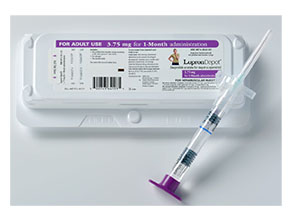
Lupron Depot (1-month) Coupons & Savings Card – Discount Prices from $1842.70
Leuprolide is used to treat certain disorders (such as endometriosis, uterine fibroids). For the treatment of uterine fibroids, leuprolide is usually given with iron to help improve anemia that is caused by too much vaginal bleeding. Leuprolide helps to reduce symptoms such as pelvic pain, painful/heavy menstrual periods, and abdominal bloating. It works by shrinking the abnormal tissue that causes these symptoms. The abnormal tissue needs the hormone estrogen to grow and spread. Leuprolide helps to decrease the amount of estrogen that is made in the body.
Our Lupron Depot (1-month) coupons are free to use. You can print the coupon, email it to yourself, or receive the Lupron Depot (1-month) coupon via text message. To get your free discount, show the pharmacist your Lupron Depot (1-month) savings card which has the discounted coupon price. Use our filters below to edit the prescription box to match your needs. The Lupron Depot (1-month) prices will update based on your prescription needs. Above our Lupron Depot (1-month) coupons, you can change the location to see pharmacy prices in other areas. Our prescription discount card will update online with the specific pharmacy costs associated with your edits. Be sure to text, email, or print the Lupron Depot (1-month) savings card code that you need after editing the prescription box and location field. Show the discount card to your pharmacist before paying.
My prescription
Edit
3.75MG, Lupron Depot (1-month) (1 Kit)
Select pharmacy

Albertsons
$1842.70
COUPON PRICE
Walgreens
$1913.97
COUPON PRICE
Walmart
$1970.53
COUPON PRICELupron Depot (1-month) savings card
Show this card to your pharmacist
Albertsons
$1842.70
BIN
ID
PCN
GRP
019876
LH0B9C9302
CHIPPO
LHX
Powered by
Leuprolide is used to treat certain disorders (such as endometriosis, uterine fibroids). For the treatment of uterine fibroids, leuprolide is usually given with iron to help improve anemia that is caused by too much vaginal bleeding. Leuprolide helps to reduce symptoms such as pelvic pain, painful/heavy menstrual periods, and abdominal bloating. It works by shrinking the abnormal tissue that causes these symptoms. The abnormal tissue needs the hormone estrogen to grow and spread. Leuprolide helps to decrease the amount of estrogen that is made in the body.
Our Lupron Depot (1-month) coupons are free to use. You can print the coupon, email it to yourself, or receive the Lupron Depot (1-month) coupon via text message. To get your free discount, show the pharmacist your Lupron Depot (1-month) savings card which has the discounted coupon price. Use our filters below to edit the prescription box to match your needs. The Lupron Depot (1-month) prices will update based on your prescription needs. Above our Lupron Depot (1-month) coupons, you can change the location to see pharmacy prices in other areas. Our prescription discount card will update online with the specific pharmacy costs associated with your edits. Be sure to text, email, or print the Lupron Depot (1-month) savings card code that you need after editing the prescription box and location field. Show the discount card to your pharmacist before paying.
Lupron Depot (1-month) FAQs
Using the SaveHealth discount card, what is the price of Lupron Depot (1-month) without insurance?
Using the SaveHealth discount card, the price of Lupron Depot (1-month) without insurance is $1842.70.
What is the price of Lupron Depot (1-month) at Walgreens?
The price of Lupron Depot (1-month) at Walgreens is $1913.97.
What is the price of Lupron Depot (1-month) at Walmart?
The price of Lupron Depot (1-month) at Walmart is $1970.53.
